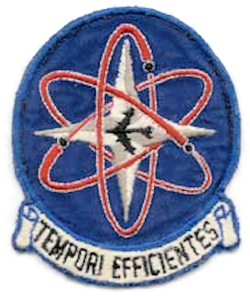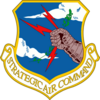428th Bombardment Squadron
This article includes a list of references, related reading, or external links, but its sources remain unclear because it lacks inline citations. (December 2012) |
| 428th Bombardment Squadron | |
|---|---|
 Emblem of the 428th Bombardment Squadron | |
| Active | 1942-1945; 1959-1962 |
| Country | United States |
| Branch | United States Air Force |
| Type | Bombardment |

The 428th Bombardment Squadron is an inactive United States Air Force unit. Its last assignment was as part of the 310th Bombardment Wing, stationed at Shilling Air Force Base, Kansas.
It was inactivated on 1 January 1962.
History
World War II
Activated as a B-25 reconnaissance squadron in early 1942, it was redesignated a medium bomber unit in April. It trained with the Third Air Force in the southeastern United States. It was deployed initially to England in September 1942 and flew some missions under VIII Bomber Command over German-occupied France; attacking enemy troop formations, bridges and airfields. It was part of the Operation Torch invasion of North Africa in November 1942, being deployed to the new Mediterranean Theater of Operations (MTO). It was assigned to the Twelfth Air Force in French Morocco in November. The squadron engaged primarily in support and interdictory operations; bombing marshalling yards, rail lines, highways, bridges, viaducts, troop concentrations, gun emplacements, shipping, harbors and other objectives in North Africa.
The squadron also engaged in psychological warfare missions, dropping propaganda leaflets behind enemy lines. It took part in the Allied operations against Axis forces in North Africa during March–May 1943, the reduction of Pantelleria and Lampedusa islands during June, the invasion of Sicily in July and the landing at Salerno in September. The squadron was also involved in the Allied advance toward Rome during January–June 1944, the invasion of Southern France in August 1944 and the Allied operations in northern Italy from September 1944 to April 1945. It was inactivated in Italy after the German capitulation in September 1945.
Strategic Air Command
From 1958, the Boeing B-47 Stratojet wings of Strategic Air Command (SAC) began to assume an alert posture at their home bases, reducing the amount of time spent on alert at overseas bases. The SAC alert cycle divided itself into four parts: planning, flying, alert and rest to meet General Thomas S. Power’s initial goal of maintaining one third of SAC’s planes on fifteen minute ground alert, fully fueled and ready for combat to reduce vulnerability to a Soviet missile strike.[1] To implement this new system B-47 wings reorganized from three to four squadrons.[1][2] The 428th was activated at Schilling Air Force Base as the fourth squadron of the 310th Bombardment Wing. The alert commitment was increased to half the squadron's aircraft in 1962 and the four squadron pattern no longer met the alert cycle commitment, so the squadron was inactivated on 1 January 1962.[2]
Lineage
- Constituted as the 39th Reconnaissance Squadron (Medium) on 28 Jan 1942
- Activated on 15 Mar 1942
- Redesignated the 428th Bombardment Squadron (Medium) on 22 Apr 1942
- Inactivated on 12 Sep 1945
- Activated on 1 Feb 1959
- Discontinued and inactivated on 1 Jan 1962
Assignments
- 310th Bombardment Group, 15 Mar 1942-12 Sep 1945
- 310th Bombardment Wing, 1 Feb 1959-1 Jan 1962
Stations
|
|
Aircraft
- B-25 Mitchell, 1942-1945
- B-47 Stratojet, 1959-1962
References
![]() This article incorporates public domain material from the Air Force Historical Research Agency
This article incorporates public domain material from the Air Force Historical Research Agency
- Maurer, Maurer, ed. (1982) [1969]. Combat Squadrons of the Air Force, World War II (PDF) (reprint ed.). Washington, DC: Office of Air Force History. ISBN 0-405-12194-6. LCCN 70605402. OCLC 72556.
- Schake, Col Kurt W. (1998). Strategic Frontier: American Bomber Bases Overseas, 1950-1960 (PDF). Trondheim, Norway: Norwegian University of Science and Technology. ISBN 978-8277650241. Retrieved July 27, 2015.

